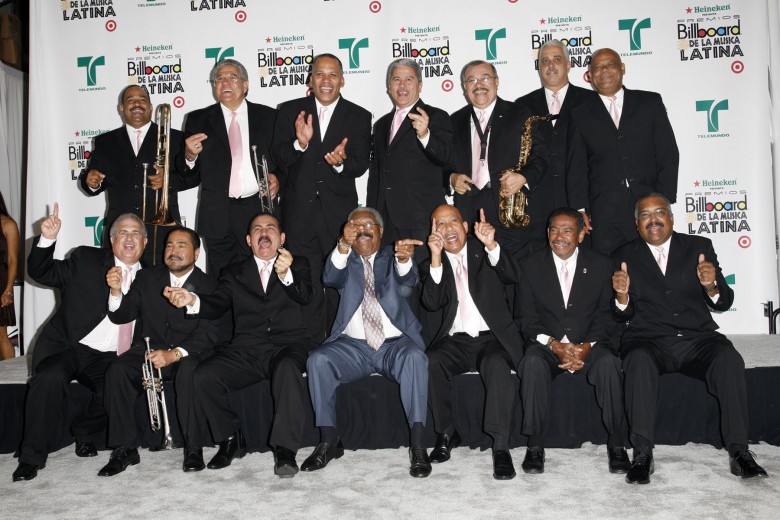Few bands can mark their success by decades. Singing about telephones, timbaleros, New York summers and brujeria has worked out well for the shining stars of the Caribbean, El Gran Combo. In 2012 they celebrate 50 years in music having made over 60 albums and hosted dozens of iconic musicians in their ranks, El Gran Combo de Puerto Rico, have more than earned the prophetic name they selected years ago.
Founded in 1962, El Gran Combo’s seeds were planted in contentious soil but bloomed into legend. The Puerto Rican ensemble had been performing with Rafael Cortijo y su Combo. When legal problems kept its lead singer Ismael Rivera from recording, the group was put on indefinite pause. Rather than waiting around for a resolution, its musicians broke off in different directions. Rafael Ithier, a pianist and songwriter and Eddie Perez, a saxophonist, were part of this core group. When Ithier was asked to put together a band to play for merengue legend Joseito Mateo, he recruited his band mates. They recorded “Meneame los Mangos,” as El Gran Combo. A name they were baptized with by Rafael Alvarez Guedes who coordinated the album’s production. Their name was a nod to their past with Cortijo and a signal of their new future. History however would once again put plans on hold. Their first record, Acangana, came out days before JFK was assassinated. Their label, Gema Records, literally stopped the presses and didn’t distribute the album in Puerto Rico and the U.S. until much later. Its eventual release brought success across the Caribbean and in the U.S.
Despite having played together for years, members began leaving almost immediately. Their original lead singer lasted as long as the group’s first live performance in San Juan. He was quickly replaced by Andy Montanez who became a group mainstay. Since then members have stayed for months or years and some for decades. Ithier and Perez are the only original members of the group that remain today while vocalists Charlie Aponte and Jerry Rivas, who joined the group in the 1970s, still remain with the orchestra. Although the faces would constantly change, the ensemble counts salsa icons such as percussionist Roberto Roena, singers Celia Cruz, Hector Lavoe and La India as contributors. The collection of famous alumni gained them the title, “La Universidad de la Salsa,” a tribute to an institution that grooms young, raw talent.
The group spent the 60s performing, recording and building their reputation. They became the house band for the local Puerto Rican show El Show de la 12, which made them fixtures in Latin American households. Despite gold records and growing popularity on and off the island, their label Gema Records dropped them. Rather than sign with another company (Motown was allegedly interested), they created Combo Records and released their own music, something they have continued to do since 1970. Estsamos Primeros was their first album as free agents and it ushered in an era of other changes. In 1971, the group added a trombonist Epifano Ceballo to their orchestra. This kind of experimentation and innovation would become their hallmarks.
The 1970s and 1980s found the group touring around the world and gaining fans across the globe. The ensemble has played everywhere from Madrid to the Netherlands, Argentina to Alaska; with their live concert album Breaking the Ice coincidentally snagging them a Grammy nomination in 1984. Their songs about love and daily life make their appeal universal.
Through the years the orchestra has witnessed historic milestones. They’ve performed to sold-out crowds at Yankee Stadium; celebrated their 20th and 25th years with concerts at Madison Square Garden; upon turning 30 they were made official musical ambassadors by the Puerto Rican Senate. While for their 40th anniversary Billboard Music recognized them with a Lifetime Achievement Award. But El Gran Combo is more than just a band of merry musicians. Academic Frances Aparicio referred to them in her book, Listening to Salsa, as a “musical tradition.”
Thanks to a rotating cast of musicians, singers and arrangers, El Gran Combo is the most enduring group of salseros in the genre. Taking a New York City-born sound, they crafted their own brand that has become the standard for salsa across the world. As Puerto Rico’s most recognizable export, the homegrown Boricuas have evolved and remained — at their core — gentlemen toiling away on their instruments, moving people to dance. For this they will always be Dons.

